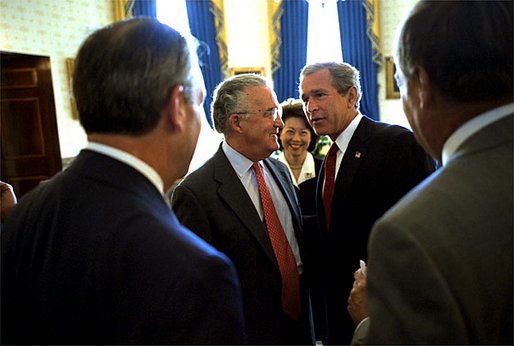|
Williams Act
The Williams Act (USA) refers to 1968 amendments to the Securities Exchange Act of 1934 enacted in 1968 regarding tender offers. The legislation was proposed by Senator Harrison A. Williams of New Jersey. The Williams Act amended the Securities and Exchange Act of 1934 (15 U.S.C. § 78a et seq.) to require mandatory disclosure of information regarding cash tender offers. When an individual, group, or corporation seeks to acquire control of another corporation, it may make a tender offer. A tender offer is a proposal to buy shares of stock from the stockholders for cash or some type of corporate security of the acquiring company. Since the mid-1960s, cash tender offers for corporate takeovers have become favored over the traditional alternative, the proxy campaign. A proxy campaign is an attempt to obtain the votes of enough shareholders to gain control of the corporation's board of directors. Because of abuses with cash tender offers, Congress passed the Williams Act in 1968, ... [...More Info...] [...Related Items...] OR: [Wikipedia] [Google] [Baidu] |
Lyndon B
Lyndon may refer to: Places * Lyndon, Alberta, Canada * Lyndon, Rutland, East Midlands, England * Lyndon, Solihull, West Midlands, England United States * Lyndon, Illinois * Lyndon, Kansas * Lyndon, Kentucky * Lyndon, New York * Lyndon, Ohio * Lyndon, Pennsylvania * Lyndon, Vermont * Lyndon, Sheboygan County, Wisconsin, a town * Lyndon, Juneau County, Wisconsin, a town Other uses * Lyndon State College, a public college located in Lyndonville, Vermont People * Lyndon (name), given name and surname See also * Lyndon School (other) * Lyndon Township (other) * * Lydon (other) * Lynden (other) * Lindon (other) * Linden (other) {{disambig, geo ... [...More Info...] [...Related Items...] OR: [Wikipedia] [Google] [Baidu] |
Stock Exchange
A stock exchange, securities exchange, or bourse is an exchange where stockbrokers and traders can buy and sell securities, such as shares of stock, bonds and other financial instruments. Stock exchanges may also provide facilities for the issue and redemption of such securities and instruments and capital events including the payment of income and dividends. Securities traded on a stock exchange include stock issued by listed companies, unit trusts, derivatives, pooled investment products and bonds. Stock exchanges often function as "continuous auction" markets with buyers and sellers consummating transactions via open outcry at a central location such as the floor of the exchange or by using an electronic system to process financial transactions. To be able to trade a security on a particular stock exchange, the security must be listed there. Usually, there is a central location for record keeping, but trade is increasingly less linked to a physical place as mod ... [...More Info...] [...Related Items...] OR: [Wikipedia] [Google] [Baidu] |
Dodd–Frank Wall Street Reform And Consumer Protection Act , and it made changes affecting all federal financial regulatory agencies and almost every part of the nation's financial services industry.
Responding to widespread calls for changes to the financial regulatory system, in June 2009, President Barack Obama introduced a proposal for a "sweeping overhaul of the United States financial regulatory system, a transformation on a scale not seen since the reforms that followed the Great Depression in the United States, Great De ...
The Dodd–Frank Wall Street Reform and Consumer Protection Act, commonly referred to as Dodd–Frank, is a United States federal law that was enacted on July 21, 2010. The law overhauled financial regulation in the aftermath of the Great Recession The Great Recession was a period of market decline in economies around the world that occurred from late 2007 to mid-2009. [...More Info...] [...Related Items...] OR: [Wikipedia] [Google] [Baidu] |
Credit Rating Agency Reform Act
The Credit Rating Agency Reform Act () is a United States federal law whose goal is to improve ratings quality for the protection of investors and in the public interest by fostering accountability, transparency, and competition in the credit rating agency industry. Enacted after being signed by President Bush on September 29, 2006, it amended the Securities Exchange Act of 1934 to require nationally recognized statistical rating organizations (NRSROs) to register with the Securities and Exchange Commission (SEC). Critics had complained that the dominance of "the big three" rating agencies – Standard & Poor's Ratings Services, Moody's Investors Service and the smaller Fitch Rating—were in part responsible for the subprime mortgage crisis of 2006–8. The agencies rated 98% of the trillions of dollars of home-mortgage oriented "structured investment" products. Hundreds of billions of dollars' worth of securities given the agencies highest—triple-A—rating were later d ... [...More Info...] [...Related Items...] OR: [Wikipedia] [Google] [Baidu] |
Sarbanes–Oxley Act
The Sarbanes–Oxley Act of 2002 is a United States federal law that mandates certain practices in financial record keeping and reporting for corporations. The act, , also known as the "Public Company Accounting Reform and Investor Protection Act" (in the Senate) and "Corporate and Auditing Accountability, Responsibility, and Transparency Act" (in the House) and more commonly called Sarbanes–Oxley, SOX or Sarbox, contains eleven sections that place requirements on all American public company boards of directors and management and public accounting firms. A number of provisions of the Act also apply to privately held companies, such as the willful destruction of evidence to impede a federal investigation. The law was enacted as a reaction to a number of major corporate and accounting scandals, including Enron and WorldCom. The sections of the bill cover responsibilities of a public corporation's board of directors, add criminal penalties for certain misconduct, and ... [...More Info...] [...Related Items...] OR: [Wikipedia] [Google] [Baidu] |
Commodity Futures Modernization Act Of 2000
The Commodity Futures Modernization Act of 2000 (CFMA) is a United States federal law that ensures that Over-the-counter (finance), over-the-counter (OTC) Derivative (finance), derivatives remained Financial regulation, unregulated. Commodity Exchange Act, The Commodity Futures Trading Commission (CFTC) had desired to have "functional regulation" of the market, but the CFMA rejected this approach. Instead, the CFTC continued to do "entity-based supervision of OTC derivatives dealers". The CFMA's handling of OTC derivatives, such as credit default swaps, has become controversial, as thesderivativesplayed a major role in the 2008 financial crisis and the Great Recession. The Commodity Futures Modernization Act (CFMA) of 2000 is a landmark piece of legislation in the United States that significantly altered the regulation of financial markets. Signed into law on December 21, 2000, the CFMA had several major impacts on the trading of derivatives, Futures contract, futures, and other f ... [...More Info...] [...Related Items...] OR: [Wikipedia] [Google] [Baidu] |
Securities Acts Amendments Of 1975
The Securities Acts Amendments of 1975 is a U.S. federal law that amended the Securities Act of 1933 and the Securities Exchange Act of 1934. It was enacted by the 94th United States Congress and signed into law by President Gerald Ford on June 4, 1975. The Securities Acts Amendments imposed an obligation on the Securities and Exchange Commission to consider the impacts that any new regulation would have on competition. The law also empowered the Securities and Exchange Commission (SEC) to establish a national market system and a system for nationwide clearance and settlement of securities transactions, enabling the SEC to enact Regulation NMS, and created the Municipal Securities Rulemaking Board (MSRB), a self-regulatory organization that writes investor protection rules and other rules regulating broker-dealers and banks in the United States The United States of America (USA), also known as the United States (U.S.) or America, is a country primarily located in North Americ ... [...More Info...] [...Related Items...] OR: [Wikipedia] [Google] [Baidu] |
Investment Company Act Of 1940
The Investment Company Act of 1940 (commonly referred to as the '40 Act) is an act of Congress which regulates investment funds. It was passed as a United States Act of Congress, Public Law () on August 22, 1940, and is codified at . Along with the Securities Exchange Act of 1934, the Investment Advisers Act of 1940, and extensive rules issued by the U.S. Securities and Exchange Commission; it is central to financial regulation in the United States. It has been updated by the Dodd-Frank Act of 2010. It is the primary source of regulation for mutual funds and closed-end funds, now a multi-trillion dollar investment industry. The 1940 Act also impacts the operations of hedge funds, private equity funds and even holding companies. History Following the founding of the mutual fund in 1924, investors invested in this new investment vehicle heavily. Five and a half years later, the Wall Street crash of 1929 occurred in the stock market, followed shortly thereafter by the United States en ... [...More Info...] [...Related Items...] OR: [Wikipedia] [Google] [Baidu] |
Investment Advisers Act Of 1940
The Investment Advisers Act of 1940, codified at through , is a United States federal law that was created to monitor and regulate the activities of investment advisers (also spelled "advisors") as defined by the law. Passing unanimously in both the House and Senate, it is the primary source of regulation of investment advisers and is administered by the U.S. Securities and Exchange Commission. Overview The law provides in part: Contents *Section 201 Findings *Section 202(a) Definitions *Section 202(b) Governments Excepted *Section 203 Registration of Investment Advisers *Section 203A State and Federal Responsibilities *Section 204 Annual and Other Reports *Section 204A Prevention of Misuse of Nonpublic Information *Section 205 Investment Advisory Contracts *Section 206 Prohibited Transactions by Investment Advisers *Section 206A Exemptions *Section 207 Material Misstatements *Section 208 General Prohibitions *Section 209 Enforcement of Title *Section 210 Publicity *Rules, Reg ... [...More Info...] [...Related Items...] OR: [Wikipedia] [Google] [Baidu] |
Trust Indenture Act Of 1939
The Trust Indenture Act of 1939 (TIA), codified at , supplements the Securities Act of 1933 in the case of the distribution of debt securities in the United States. Generally speaking, the TIA requires the appointment of a suitably independent and qualified trustee to act for the benefit of the holders of the securities, and specifies various substantive provisions for the trust indenture that must be entered into by the issuer and the trustee. The TIA is administered by the U.S. Securities and Exchange Commission (SEC), which has made various regulations under the act. History Section 211 of The Securities Exchange Act of 1934 mandated that the SEC conduct various studies. Although not expressly required to study the trustee system then in use for the issuance of debt securities, William O. Douglas, who would later become a Commissioner and then Chair of the SEC, was convinced by November 1934 that the system needed legislative reform. In June 1936, the Protective Committee S ... [...More Info...] [...Related Items...] OR: [Wikipedia] [Google] [Baidu] |



